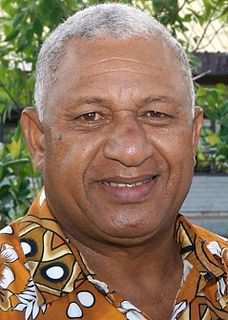
Brigadier-General Ratu Epeli Nailatikau, CF, LVO, OBE, MSD, KStJ, is a Fijian chief who was President of Fiji from 2009 to 2015. He has had a long career in the Military, diplomatic service, and government. From 2001 to 2006 he served as Speaker of the House of Representatives – the lower and more powerful chamber of the Fijian Parliament. He was also the Chairman of the Parliamentary Appropriations Committee and of the House Committee. On 8 January 2007, he was appointed the interim Minister for Foreign Affairs and External Trade; he was moved to the post of interim Minister for Provincial Development and Multi-Ethnic Affairs in September 2008. In October 2008, he became Indigenous Affairs Minister "and effectively Great Council of Chiefs chairman". On 17 April 2009, he was appointed Vice-President by the Military government.
The 1997 Constitution of Fiji was the supreme law of Fiji from its adoption in 1997 until 2009 when President Josefa Iloilo purported to abrogate it. It was also suspended for a period following the 2000 coup d'état led by George Speight.
Ratu Tevita Momoedonu is a Fijian chief and has served as the fifth Prime Minister of Fiji twice – each time extremely briefly. Both appointments were to get around constitutional technicalities; his first term of office – on 27 May 2000 lasted only a few minutes. His second term – from 14 to 16 March 2001 was for two days. He subsequently served his country as Ambassador to Japan. Using his chiefly title of "Taukei Sawaieke", he later led pushes for the Yasana of Ba to secede from the Burebasaga and Kubuna Confederacies to form their own fourth confederacy under the Tui Vuda, Ratu Josefa Iloilo, who died in 2011.

The Fiji coup of 2000 was a complicated affair involving a civilian coup d'état by hardline i-Taukei nationalists against the elected government of a Fijian of Indian Descent Prime Minister, Mahendra Chaudhry, on 19 May 2000, the attempt by President Ratu Sir Kamisese Mara to assert executive authority on 27 May, and his own resignation, possibly forced, on 29 May. An interim government headed by Commodore Frank Bainimarama was set up, and handed power over to an interim administration headed by Ratu Josefa Iloilo, as President, on 13 July.

Two military mutinies took place in connection with the civilian coup d'état that occurred in Fiji in 2000, the first while the rebellion instigated by George Speight was in progress, and the second four months after it had ended.
Since attaining independence from the United Kingdom on 10 October 1970, Fijian history has been marked by exponential economic growth up to 1987, followed by relative stagnation, caused to a large extent by political instability following two military coups in 1987 and a civilian putsch in 2000. This was followed by another military coup in 2006. Rivalry between indigenous Fijians and Indo-Fijians, rather than ideological differences, have been the most visible cleavage of Fijian politics.

The tension between Fiji's government and Military forces, which had been simmering for more than two years, appeared to escalate in late December 2005. Tension between the government and the Military had been simmering throughout the year, with Commodore Bainimarama and other Military officers making strongly worded public statements opposing certain government policies, including the early release from prison of persons implicated in the Fiji coup of 2000, and the government's promotion of controversial legislation to establish a Commission with the power to grant amnesty to perpetrators of the coup.

The Methodist Church of Fiji and Rotuma is the largest Christian denomination in Fiji, with 36.2 percent of the total population at the 1996 census. Of the 280,628 persons identifying themselves as Methodists, 261,972 were indigenous Fijians, 5,432 were Indo-Fijians, and 13,224 were from other ethnic communities.
Jona Baravilala Senilagakali was a Fijian medical doctor and diplomat who briefly served as Prime Minister of Fiji from December 2006 to January 2007. Subsequently, he was Minister for Health from 2007 to 2008.
Richard Naidu is a Fijian lawyer of Indian descent. A partner with the Munro Leys law firm, he was an unsuccessful candidate for the Presidency of the Fiji Law Society on 9 September 2006.
The Fijian constitutional crisis of 2009 began on Friday, 10 April 2009. Fijian President Ratu Josefa Iloilo announced on a nationwide radio broadcast that he was abrogating the Constitution of Fiji. He dismissed all judges and constitutional appointees and assumed all governance in the country after the Court of Appeal ruled that the government of Prime Minister Frank Bainimarama was illegal. Iloilo reinstalled Bainimarama as PM and his Cabinet members to their positions. He also instituted emergency rule which increased police powers and allowed media censorship.
The following lists events that happened during 2006 in the Republic of Fiji.
The interim cabinet of Fiji was appointed in January 2007, following the 2006 Fijian coup d'état.








